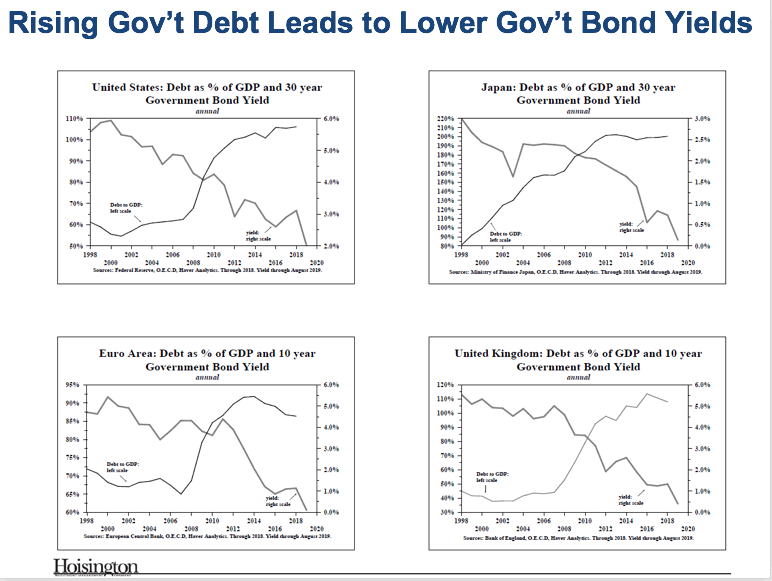How High Debt Affects Bond Interest Rates
Interest-Rates / International Bond Market Oct 22, 2019 - 01:22 PM GMTBy: Harry_Dent
 The only Phd economist I allow to speak each year at the Irrational Economic Summit is Dr. Lacy Hunt. (You can watch his presentation from this year’s conference here.) Lacy can take that complex science and still see the forest for the trees. He can still find reality from all of that great theory to real-life outcomes.
The only Phd economist I allow to speak each year at the Irrational Economic Summit is Dr. Lacy Hunt. (You can watch his presentation from this year’s conference here.) Lacy can take that complex science and still see the forest for the trees. He can still find reality from all of that great theory to real-life outcomes.
It also helps that he advises a $4 billion bond fund at Housington Management and has to get the reality of bond interest rates right or face the consequences – which he has for this entire boom!
High Debt Doesn’t Equal Higher Rates
At IES, Lacy started off breaking one natural assumption of investors in his first slide. You would think that rising government debt levels would lead to higher bond interest rates. Higher debt means higher growth. Higher growth tends to cause higher inflation, and that in turn causes higher short and longer-term rates to compensate. Oh, and to sell more debt you have to raise the rates to attract investors to absorb it all.
This chart pretty much proves these natural assumptions are false!

Here’s What Happens Instead…
The U.S. accelerated debt as a percent of GDP from 2007 through 2014, and T-bond yields fell from 5% down to 2.5% into 2016 on a two-year lag. Similar for the Eurozone with bond rates falling from 4.5% to 1.0%. Japan has been goosing debt the most from 1998 into 2013 and its bond rates fell from 3.0% to o.7% by 2016 on a 3-year lag. The U.K. was the most extreme in rising debt from 2007 into 2016 with falling rates from 5% down to 0.5% currently.
Here’s what tends to happen instead. Higher government debt tends to lead to “diminishing returns,” or falling ratios of GDP created per dollar of debt, which Lacy later shows has clearly been the case. So, like any drug, it takes more and more to create less effect. Higher debt becomes a greater burden through rising interest and servicing costs – and that slows economic growth.
It also encourages businesses and consumers to over-invest and that excess capacity lowers prices and inflation.
Voila: Another simple insight in a seemingly complex economy. And why I love Lacy!
Harry
Follow me on Twitter @HarryDentjr
P.S. Another way to stay ahead is by reading the 27 simple stock secrets that our Seven-Figure Trader says are worth $588,221. You’ll find the details here.
Harry studied economics in college in the ’70s, but found it vague and inconclusive. He became so disillusioned by the state of the profession that he turned his back on it. Instead, he threw himself into the burgeoning New Science of Finance, which married economic research and market research and encompassed identifying and studying demographic trends, business cycles, consumers’ purchasing power and many, many other trends that empowered him to forecast economic and market changes.
Copyright © 2019 Harry Dent- All Rights Reserved Disclaimer: The above is a matter of opinion provided for general information purposes only and is not intended as investment advice. Information and analysis above are derived from sources and utilising methods believed to be reliable, but we cannot accept responsibility for any losses you may incur as a result of this analysis. Individuals should consult with their personal financial advisors.
© 2005-2022 http://www.MarketOracle.co.uk - The Market Oracle is a FREE Daily Financial Markets Analysis & Forecasting online publication.


